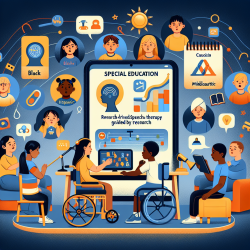As educators and therapists, understanding the intricate dynamics that influence a student's mental health is crucial. Recent research titled "Direct and Indirect Associations between Family Residential Mobility, Parent Functioning, and Adolescent Behavioral Health" sheds light on how frequent family moves can significantly affect adolescents' behavioral health. This blog explores these findings and offers insights into how practitioners can apply this knowledge to improve their practice.
The Research Findings
The study conducted by Du and Kim (2021) highlights two critical factors: family residential mobility and caregiver social support. It reveals that frequent moves are associated with increased levels of caregiver depression, which subsequently leads to more adolescent internalizing (e.g., anxiety) and externalizing (e.g., aggression) problems. Conversely, higher levels of caregiver social support can mitigate these negative outcomes.
Key Takeaways:
- Residential Mobility: Frequent moves are linked to higher caregiver depression, affecting adolescent mental health.
- Caregiver Social Support: Acts as a protective factor by reducing caregiver depression and improving adolescent outcomes.
- Mediating Role of Depression: Caregiver depression mediates the relationship between mobility/support and adolescent behavior.
Implications for Practitioners
The findings underscore the importance of providing robust social support systems for caregivers to enhance adolescent well-being. Here are some actionable steps practitioners can take:
- Create Support Networks: Develop programs that foster community support for caregivers, such as peer groups or mentorship programs.
- Mental Health Monitoring: Regularly assess both students' and caregivers' mental health to identify those at risk due to frequent relocations.
- Counseling Services: Offer targeted counseling services that address the unique challenges faced by mobile families.
- Collaboration with Schools: Work closely with schools to provide stability and continuity in education for highly mobile students.
The Call for Further Research
This study opens avenues for further exploration into how different types of mobility (voluntary vs. involuntary) impact mental health differently. Additionally, examining other mediating factors such as peer relationships or school environment could provide a more comprehensive understanding.
If you're interested in delving deeper into this topic, consider conducting your own research or collaborating with academic institutions to explore these dynamics further.










